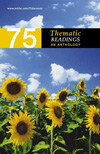
Ursula Le Guin |  |
Ursula Le GuinUrsula Le Guin, "Those Who Walk Away from Omelas" Ursula Le Guin (1929- ) was born in Berkeley, California and earned
an A.B. from Radcliffe College in 1951 and an A.M from Columbia University
in 1952. She's taught at Mercer University, the University of Idaho, and
Stanford University. Le Guin writes children's books, poems, essays, short
stories, and novels. Her many books include the novels City of Illusions
(1967), Earthsea (1977) and Eye of the Heron (1983); Dancing
at the Edge of the World: Thoughts on Words, Women, Places (1989),
and Birthday of the World and Other Stories (2002). She also contributes
to periodicals such as Fantasy & ScienceFiction, Sunset,
Kenyon Review, and the LosAngelesTimes.
Le Guin's won five Nebula Awards for her science fiction writing. A look
at a troubling utopia, "Those Who Walk Away from Omelas" was
first published in 1973 in NewDimensions and reprinted
in The Wind's Twelve Quarters: Short Stories (1975). | QUESTIONS FOR DISCUSSION | CONTENT - What ceremony does the author mention early in the piece?
- What is drooz?
- Briefly discuss what the town of Omelas looks like.
- What does the narrator mean by the phrase the treason of the
artist?
- Discuss what's going on in the room with one locked door and no
window.
- How does the narrator conclude that those who live in Omelas have
no cars and helicopters from the observation that they are a happy people?
- How would you describe the citizens of Omelas?
STRATEGY AND STYLE - Characterize the process of rationalization that's found in paragraph
thirty-two. What does this say about the relationship of the narrator
to the ordinary citizens of Omelas?
- What role does description play in this story? Where specifically
does Le Guin make an appeal to the senses? Which ones? How effective
is this description?
- Characterize the tone of the narrator's voice. Is it chatty, aloof,
detached, cynical, academic, or something else? Where can you point
to evidence in your text that supports your answer?
- What is the central conflict in this story? Around which characters
does Le Guin create it? When in the story does it become apparent? Does
it make for an effective conclusion?
| ENGAGING THE TEXT | - How did reading this piece of fiction among all the nonfiction
in your textbook strike you? Do you approach studying this kind of writing
differently from studying the other? Explain.
- Would you leave Omelas or stay? Did this choice occur to you during
your reading? Are you recalling the reading now?
| SUGGESTIONS FOR SUSTAINED WRITING | - Le Guin writes that we have a bad habit of equating happiness with
stupidity. Formulate this idea into a thesis and write an essay that
explains why this is or isn't true. Does the author make a similar equation
in her story?
- Write a definition essay that defines what a utopia is. Use some
of Le Guin's ideas as points of connection, departure, or both.
| FOR FURTHER RESEARCH | Some critics have noticed that Omelas contains the word Salem
backwards, and have tied it into their analysis of this story. Do some
research into the meaning of Salem, besides its use as a popular
name for a town in the U.S. Then, find out the author's recounting of
her coming up with the title. (Hint: if you get stuck, go to a search
engine and enter the author's name, and the words Salem and Oregon.)
Does the author's recollection seem to invalidate such critical analysis?
Does she have the final word? | WEB CONNECTION | Here are the citations
for Le Guin's five Nebula Awards, given by the Science Fiction and Fantasy
Writers of America. Do you read science fiction? Scan the list and see
how many other names you can recognize. | LINKS | Biographical This lengthy biography
from Salon.com is a good place to start researching Le Guin's life.
You'll also find a photo of the author there. On this page,
you'll find a link to a Le Guin biography, as well as links to bibliographies,
interviews, and other useful information. This page has
a link to a biography, and links to things including a FAQ, a cover
gallery, and a search engine. This site and the one above both describe
themselves as "unofficial." Does that make the information
on them untrustworthy? How can you tell?
Bibliographical Looking for a quotation by Le Guin to start a paper? Take a look
at this page.
Here's an interview
about writing with Le Guin from Writing-World.com called "Steering
Her Craft." What does the title mean? Ready for some of this author's work in etext? Click here
for an excerpt of her book The Telling.
Cultural Wondering if any of Le Guin's work has been adapted for film or
television? Check out this filmography,
which also has some links, including one to Le Guin-related trivia. Here's some information
about a fiction prize named after Le Guin, sponsored by the magazine
Rosebud. Interested in researching the field of science fiction, but not
sure where to start? This huge directory
from Google.com should get you going in no time. Why do you think science
fiction gets such internet coverage?
|
|
|
|